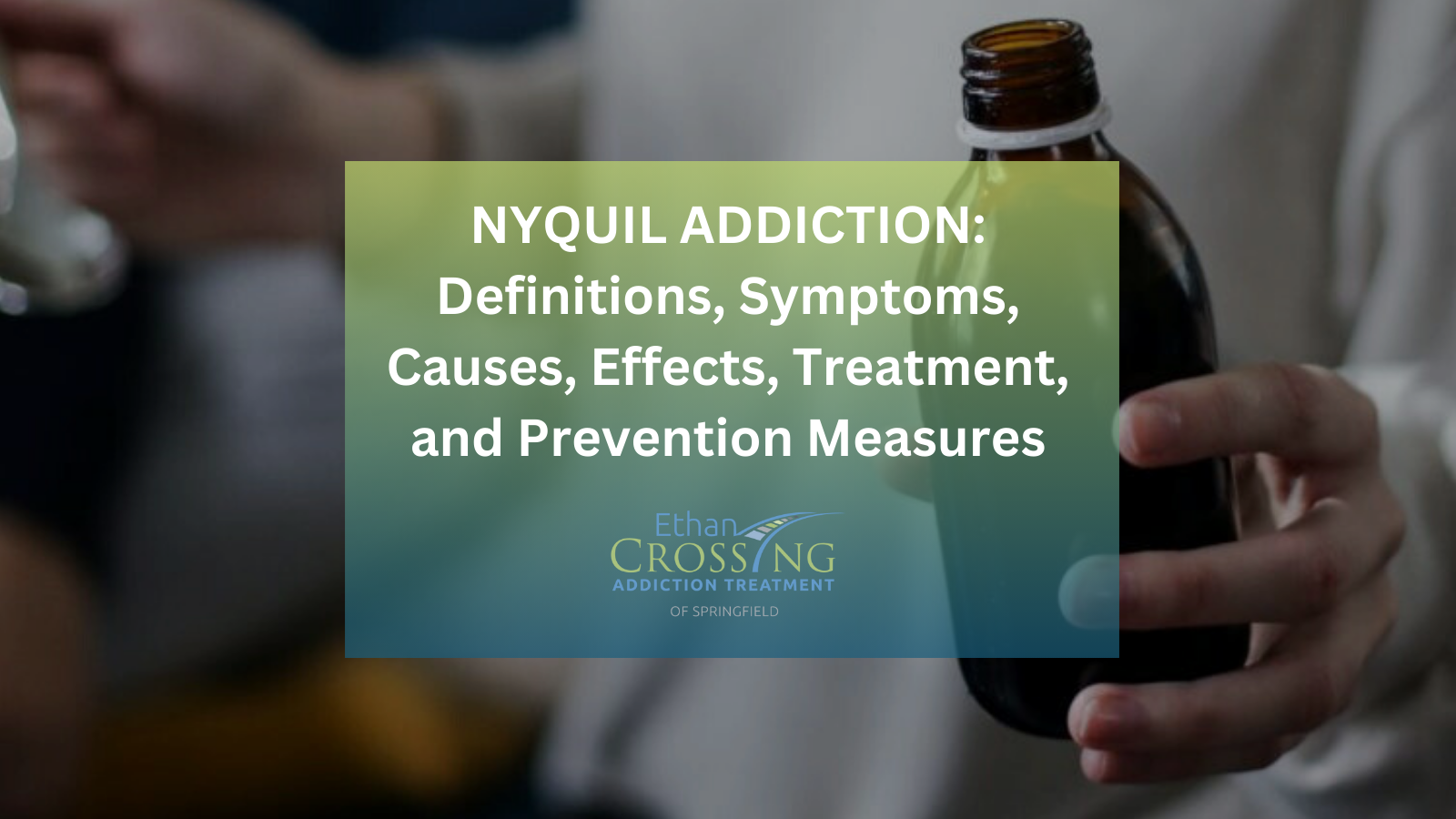Nyquil addiction is a compulsive dependency on the over-the-counter drug Nyquil, not minding the adverse effects it has. Nyquil is used to treat the symptoms of the common cold, flu, allergies, and other respiratory infections, but abuse or prolonged use leads to addiction or dependency.
Symptoms of Nyquil addiction include increased tolerance to the drug, withdrawal symptoms, intense cravings, loss of focus, and difficulty quitting. These signs not only disrupt daily life but can also lead to significant health issues, emphasizing the need for early intervention and professional support.
Nyquil addiction is caused by numerous factors like chemical dependency on the ingredient in the drug, psychological factors such as emotional issues and stress, and genetic predisposition.
Effects of Nyquil addiction include liver damage, respiratory depression, heart problems, relationship strain, isolation, financial strain, legal issues, cognitive impairment, anxiety, and withdrawal signs.
Treatment options for people addicted to Nyquil include detoxification, cognitive behavioral therapy, and medication-assisted treatments to manage cravings.
Preventing addiction can be prevented by using educational campaigns to create awareness, strict regulations to reduce accessibility, early intervention, and the use of alternative medications for respiratory-related issues.
Table of Contents
What Is Nyquil Addiction?
Nyquil addiction is a compulsive use of the over-the-counter medication Nyquil, which is initially intended to relieve symptoms of the cold and flu. This form of addiction arises when individuals start using Nyquil not just for its medicinal purposes but for the sedative effects it offers, leading to a feeling of reward or euphoria.
As with other addictions, the feeling of reward is a key component, as it taps into the brain’s reward system, potentially leading to increased tolerance and withdrawal symptoms when the drug is not taken.
As reported by Wilson MD et al.’s 2000-2010 study ‘Monitoring trends in dextromethorphan abuse using National Poison Data System,’ there was a peak in DXM abuse in 2006, with 34,755 exposures reported by the National Poison Data System. Dextromethorphan, DXM, is a key component in Nyquil.
What Causes Nyquil Addiction?
The causes of Nyquil addiction include a combination of factors. The following are the common causes of Nyquil addiction:
- Chemical Dependence
Prolonged use of Nyquil makes the user dependent on the drug’s three active ingredients: dextromethorphan, doxylamine, and acetaminophen. The body adapts to these chemicals and develops a tolerance for them.
To get the same effect, the user will have to take higher doses than necessary. When the body adapts to these chemicals, it requires them to function normally, leading to addiction.
- Psychological Factors
Mental health issues such as anxiety, depression, and stress increase the chances of getting addicted to Nyquil. Individuals who use Nyquil as a coping mechanism or form of self-medication to relieve discomfort or anxiety have a greater likelihood of getting addicted.
- Genetic Predisposition
Certain genetic factors or genes play a role in increasing the risk of addiction in some individuals. Genetic factors influence how individuals respond to drugs, so a person with a family history of substance abuse is at higher risk of Nyquil addiction.
Bevilacqua and Goldman’s 2009 research ‘Genes and Addictions’ indicates that genetics significantly influence one’s susceptibility to addiction. Therefore, those with a family history of addictive behaviors are more likely to develop a Nyquil addiction.
- Environmental Influences
Living where Nyquil is easily accessible or is a regular use influences the development of addiction. Peer pressure and exposure to stressful or traumatic events also increase the likelihood of getting addicted to Nyquil.
- Mental Health Disorders
Individuals with mental health conditions like anxiety, PTSD, and depression will get addicted to Nyquil if they rely on it to manage their conditions. Often, managing these disorders through self-medication blows up into addiction.
- Lack Of Awareness
Most people are not aware of the addictive potential of Nyquil. A lack of education or misconceptions about the safety of Nyquil contributes to drug misuse and addiction.
What Are The Effects Of Nyquil Addiction?
The effect of Nyquil addiction is felt throughout all aspects of an addict’s life, even down to their finances and relationships.
The following are the effects of Nyquil addiction on its users:
Physical Health Effects
- Excessive consumption of the acetaminophen in Nyquil increases the risk of liver toxicity or failure.
- Heavy doses of doxylamine in Nyquil suppress respiratory functions. This risk increases when taken with other substances like alcohol or opioids.
- Overuse of Nyquil increases the risk of digestive problems like nausea, vomiting, constipation, and other gastrointestinal issues.
Psychological Effects
- Prolonged use of Nyquil leads to mood swings or fluctuations. These fluctuations range from joy when on the drug to irritability or depression during withdrawal periods or when not on the drug.
- Nyquil addiction impairs cognitive function and affects the user’s memory, attention, and decision-making abilities.
- Individuals addicted to Nyquil often develop heightened anxiety and feelings of paranoia.
Social Effects
- Individuals addicted to Nyquil tend to become isolated and prioritize drug use over social responsibilities and interactions.
- Nyquil’s addiction often leads to changes in behavior and neglect of personal and family obligations, causing tension and conflict with loved ones.
- It can also cause a breakdown in trust between relationships, leading to feelings of betrayal and resentment.
Legal And Financial Effects
- Supporting Nyquil addiction is expensive, and prolonged usage will put a strain on the user’s finances.
- Nyquil impairs cognitive and motor function, increasing the risk of accidents or legal penalties for impaired driving.
- Buying or possessing Nyquil without a prescription is illegal. Also, there is the abuse or misuse of Nyquil, which is unlawful.
What Are Signs Of Nyquil Addiction?
Signs of Nyquil addiction can vary from individual to person. The following are the signs that a person is addicted to Nyquil:
- Increased tolerance: Overuse of Nyquil increases the dosage necessary to achieve the desired effects a smaller dose used to give.
- Withdrawal symptoms: Attempt to stop the misuse of Nyquil leads to symptoms such as nausea, sweating, tremors, anxiety, insomnia, and flu-like symptoms.
- Preoccupation with Nyquil: Users often spend a considerable amount of time sourcing and buying Nyquil instead of other activities or responsibilities.
- Loss of control: Nyquil addicts are unable to control the choice to not use the drug despite knowing the effects it has on their overall well-being.
- Secrecy and deception: Individuals addicted to Nyquil exhibit secretive behavior like hiding and stockpiling the medication, lying, and seeking multiple prescriptions from doctors.
- Social withdrawal: Nyquil addiction increases social isolation. Individuals with Nyquil use disorder often hide from family and friends in order to use without judgment or interference.
- Changes in mood: Nyquil addicts show signs of mood swings, irritability, agitation, anxiety, or depression, especially during withdrawal.
- Physical symptoms: Nyquil addiction comes with physical signs such as dizziness, drowsiness, slowed breathing, or gastrointestinal problems.
How Does Long-Term Use Of Nyquil Affect Physical Health?
Long-term use of Nyquil has lots of harmful effects on physical health. The following are the long-term effects of Nyquil on the user;
Liver damage: The acetaminophen in Nyquil metabolizes in the liver. Long-term use increases the risk of acetaminophen overdose, causing liver toxicity or, worse, liver failure.
Gastrointestinal issues: Prolonged use of Nyquil leads to the risk of digestive problems such as abdominal pain, constipation, vomiting, and nausea.
Respiratory depression: The doxylamine in Nyquil suppresses respiratory function, increasing the risk of slowed or shallow breathing.
Cardiovascular effects: Individuals with Nyquil addiction often experience changes in heart rate or blood pressure, especially if they already have an underlying cardiovascular condition.
Kidney damage: Prolonged use of Nyquil increases the likelihood of kidney damage. The antihistamines in Nyquil are bad for the kidneys, especially for individuals with pre-existing liver conditions.
Neurological effects: chronic use of Nyquil contributes to neurological side effects such as dizziness, impaired cognitive function, and drowsiness.
Dependency: Long-term use of Nyquil ends in addiction. After a while, the individual develops an intense urge to use the medication in order to function.
What Are The Treatment Options For Nyquil Addiction?
Treatment of Nyquil addiction involves the use of medication, behavioral therapy, support groups, and lifestyle changes.
The following are some of the treatment options available recommended for people addicted to Nyquil:
- Detoxification: Detoxification helps Nyquil addicts manage withdrawal symptoms. Detoxification should be medically supervised.
- Behavioral therapy: Behavioral therapies help individuals struggling with Nyquil addiction develop coping skills, address the mental aspects of addictions, and modify their unhealthy behaviors. Behavioral treatment includes motivational interviewing, contingency management, and cognitive-behavioral therapy.
- Support groups: Support groups offer people with addiction problems peer support, accountability, and encouragement during recovery.
- Medication-assisted treatment: Some medications help Nyquil addicts manage cravings, relieve withdrawal symptoms, and treat mental disorders,
- Lifestyle changes: Making positive changes to one’s lifestyle increases the chances of recovering from Nyquil addiction. Lifestyle changes include adopting a healthy diet, regular exercise, creating a stable routine, and practicing stress management.
What Are Prevention Measures for Nyquil Addiction?
We can prevent Nyquil addiction by implementing strategic measures at different societal levels. Here are some prevention measures for Nyquil addiction;
- Education and awareness: Alerting the public to the risks of Nyquil addiction will help people make better decisions about medication use. These awareness campaigns should provide information about dosage and negative effects.
- Regulation: Regulation of the sale and distribution of Nyquil will help reduce the risk of abusing the drug. These regulations can include age, package size, marketing, and advertising.
- Safe use guidelines: There should be a clear guideline on the proper use of Nyquil. This guideline will help prevent misuse and reduce the rate of addiction.
- Alternative treatment option: Promoting alternative treatments for cold and flu symptoms will lower the potential for Nyquil abuse, which leads to addiction.
- Promoting a healthy lifestyle: Promoting healthy lifestyle choices such as a nutritious diet, regular exercise, and routine will help reduce the need to rely on chemical substances for functionality.
Is Nyquil Addictive?
Nyquil is addictive when misused or used for a long time. It contains ingredients that produce a psychoactive effect that causes dependence in some individuals.
What Are The Signs Of Nyquil Addiction?
Signs of Nyquil addiction include increased tolerance, withdrawal symptoms, secretive behavior, mood swings, and financial problems.
Can the use of over-the-counter (OTC) medications like NyQuil lead to other substance addictions?
Yes, the misuse of OTC medications like NyQuil can potentially lead to other substance addictions. This can occur when individuals seek stronger effects from other substances if they build a tolerance to the OTC medication. The risk increases if the underlying causes of the initial misuse, such as anxiety or sleep disorders, are not properly addressed. This pattern is similar to nicotine addiction, where individuals may escalate their usage or turn to additional substances to maintain the desired effects.
What treatment strategies are effective for both NyQuil and oxycodone addiction?
Treatment strategies for addiction to both NyQuil and oxycodone often involve a combination of detoxification, behavioral therapies, and support groups. While the intensity of treatment may vary—more intensive care like medication-assisted treatment (MAT) may be necessary for oxycodone addiction due to its potent opioid effects—fundamental principles of addiction treatment remain similar. These include addressing the psychological dependency through counseling and therapy, and providing support for withdrawal symptoms to minimize relapse risk.
How Long Does Nyquil Stay In Your System?
Nyquil can stay in the system for 48 to 72 hours. However, the duration varies depending on factors like individual metabolism, dosage, and frequency of use.
What Are The Health Effects Of Long-Term Nyquil Use?
Effects of long-term nyquil use include liver damage, gastrointestinal issues, respiratory depression, cardiovascular effects, and neurological symptoms.
How Can Nyquil Addiction Be Treated?
Nyquil addiction is treatable using a combination of medication, behavioral therapies, support groups, and lifestyle changes. These treatment options include detoxification, cognitive-behavioral therapies, support groups, and aftercare planning.











